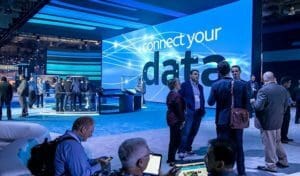Twitter Feed
2018 AT&T Business Summit: Security “in” and “of” the Cloud
While public cloud is undoubtedly an outsized piece of the conversation, news headlines of the latest data breach can make this move a very frightening proposition. The question of how…
My Brush with Royalty: Queen Latifah
Queen Latifah! Hip Hop Icon. Movie Star. Television Star. Fashion Model. Songwriter. Producer. Entrepreneurial Genius!? YES! Dana Elaine Owens, her given name, is co-owner of Flavor Unit Entertainment, a firm that includes…
What’s New in Puppet 5?
Puppet 5 is released and comes with several exciting enhancements and features that promise to make configuration management much more streamlined. This article will take a comprehensive look at these…
5 Reasons Why Ansible is the Best CM Tool Out There?
Amidst volatile markets, dynamic technology shifts, and ever-increasing customer demands, it is imperative for IT organizations to develop flexible, scalable and high-quality applications that exceed expectations and enhance productivity. A…
Machine learning APIs for Google Cloud Platform
Google Cloud Platform (GCP) is considered to be one of the Big 3 cloud platforms among Microsoft Azure and AWS. GCP is widely used cloud solutions supporting AI capabilities to design and…
What Is The Most Important Part of Architecture?
I always find it interesting to hear what people view architecture as. A lot of people think it’s just about the design aspect, where you get to put pen to…
Cloud migration best practice Part 4: Executing the migration
This series has stepped through cloud migration best practices. After providing an overview, we discussed: Classifying business-critical data. Updating organizational IT governance policies. Application screening and cloud workload selection. How to…
Cloud Migration Best Practice Part 3: Application Portfolio Analysis
In part three of this series on cloud migration best practice, I will focus on migrating the application itself. If you haven’t had the opportunity to read our recommendations from part…
Why Use Immutable Storage?
Data has become a global currency, and its value has nowhere to go but up. According to The Economist online, the world’s most valuable resource is no longer oil, but…
CLOUD ACT: What Does That Mean for Your Cloud Storage
When Congress names a law after you, it’s getting serious. That is where we are now with cloud computing. The Clarifying Lawful Overseas Use of Data Act or CLOUD Act (H.R. 4943) is…
This is clearly the question on the minds and lips of every government IT decsionmaker in town. Why should a government agency even consider cloud computing? In reality, the decision process is no different than any other IT management decision, “Cloud IT” options should be compared to “Traditional IT” approaches. As Frank Gens of IDC alluded to when he framed the cloud opportunity for IT suppliers, agencies have four options when deciding if and how to improve their IT infrastructure.
- “Traditional IT” products and services to enhance traditional agency services;
- “Cloud IT” products and services to enhance traditional agency services;
- Traditional IT” products and services to create agency specific cloud services; and
- “Cloud IT” products and services to create agency specific cloud services.
In a ZDnet blog post that compared traditional with cloud IT, Dion Hinchcliffe summarized the differences as shown in the table below.
|
|
Traditional IT |
Cloud IT |
|
Design Approach |
Proprietary, customized |
Standardized |
|
Economy of Scale |
Organizational |
Ecosystem |
|
Control |
Full |
Partial |
|
Security |
Most secure |
Secure |
|
Capacity |
Limited |
Nearly unlimited |
|
Infrastructure |
Dedicated |
Shared |
Any decision process must take into account the agency’s mission goals, the specific agency function being addressed and the current IT infrastructure. From a mission point of view, the comparison factors listed above can be addressed using six straight-forward yes/no questions:
- Can this function within the agency’s mission be accomplished with the use of standard IT components or are proprietary or customized components necessary?
– Yes, “Cloud IT” is an option
– No, “Traditional IT” approach may be required
- In anticipating future functional requirements, do the investments required and value obtained by letting the agency develop technical improvements outweigh the investment savings and time lost in leveraging technical improvement from an industry ecosystem?
– Yes, “Traditional IT” may be required
– No, “Cloud IT” is an option
- In view of agency mission objectives, is full control of all IT resources required to complete this function?
– Yes, “Traditional IT” may be required
– No, “Cloud IT” is an option
- Is the level of security afforded by generally accepted commercial practices acceptable in accomplishing this specific agency function?
– Yes, “Cloud IT” is an option
– No, “Traditional IT” may be required
- In executing this function during surge or peak situations, would capacity limitation severely affect agency mission accomplishment?
– Yes, “Cloud IT” should be considered as an option
– No, “Traditional IT” may be desirable
- In view of agency mission objectives, is a dedicated IT infrastructure required to complete this function?
– Yes, “Traditional IT” may be required
– No, “Cloud IT” is an option
By weighing each factor and answering these questions, could this framework help in discussing the use of “Traditional IT” versus “Cloud IT”?
What do you think?
Cloud Computing
- CPUcoin Expands CPU/GPU Power Sharing with Cudo Ventures Enterprise Network Partnership
- CPUcoin Expands CPU/GPU Power Sharing with Cudo Ventures Enterprise Network Partnership
- Route1 Announces Q2 2019 Financial Results
- CPUcoin Expands CPU/GPU Power Sharing with Cudo Ventures Enterprise Network Partnership
- ChannelAdvisor to Present at the D.A. Davidson 18th Annual Technology Conference
Cybersecurity
- Route1 Announces Q2 2019 Financial Results
- FIRST US BANCSHARES, INC. DECLARES CASH DIVIDEND
- Business Continuity Management Planning Solution Market is Expected to Grow ~ US$ 1.6 Bn by the end of 2029 - PMR
- Atos delivers Quantum-Learning-as-a-Service to Xofia to enable artificial intelligence solutions
- New Ares IoT Botnet discovered on Android OS based Set-Top Boxes


